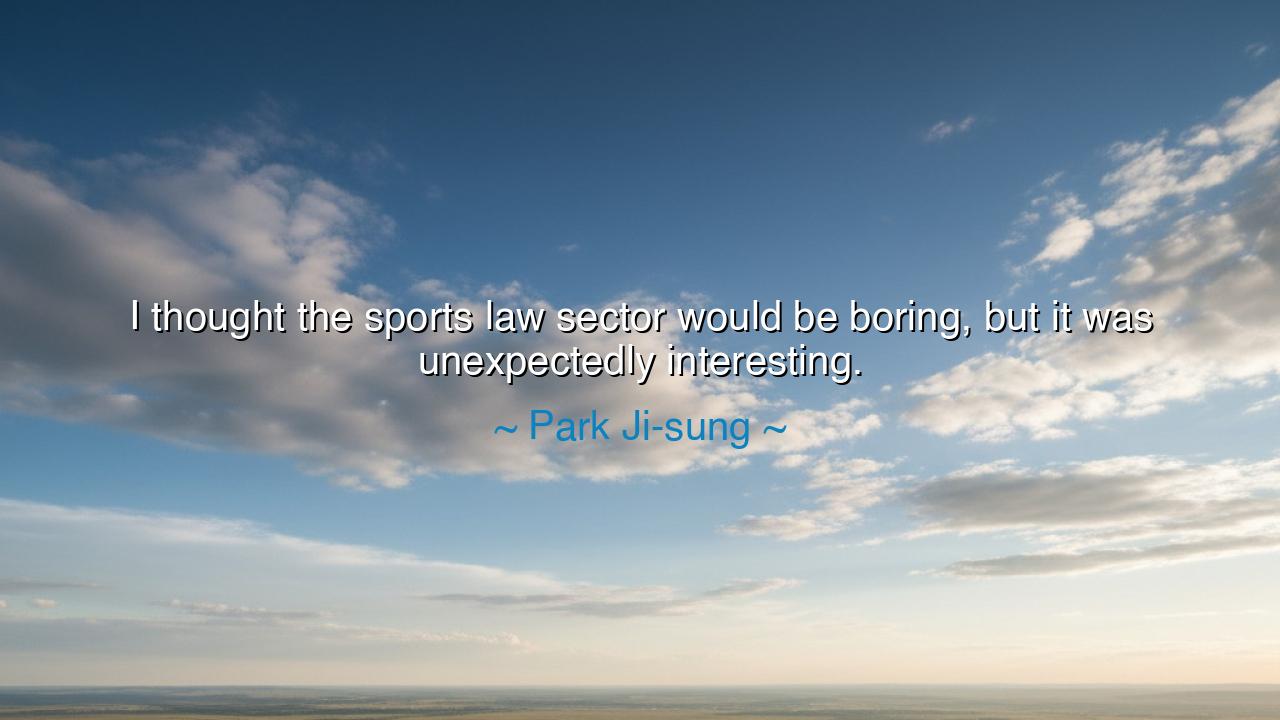
I thought the sports law sector would be boring, but it was






Hear the voice of Park Ji-sung, a warrior of the field who once ran tirelessly upon the green grass of football, yet who later turned his eyes to study and reflection: “I thought the sports law sector would be boring, but it was unexpectedly interesting.” At first glance, these words may seem plain, almost casual. Yet within them lies a profound lesson about expectation, humility, and the hidden treasures of the unknown.
When he speaks of boredom, he confesses what many of us feel when we encounter paths unfamiliar. The human heart often fears or dismisses what it does not know, judging it dull before even stepping upon it. So it was with Park, who once lived in the roar of the stadium, where the crowd’s cheers thundered like waves. What could the quiet world of sports law offer compared to such glory? Yet the truth he discovered reminds us that greatness is not confined to one form. The stillness of study, the intricacy of law, can hold as much vitality as the clash of players beneath floodlights.
The surprise of finding interest where one expected nothing is the awakening of the wise. It is the reminder that the world is vast, and that joy often hides in unexpected places. The farmer may find poetry in the patterns of rain; the soldier may find peace in tending a garden. Park Ji-sung discovered that even the structures of contracts, rights, and fairness—though seemingly lifeless—are bound with the heartbeat of sport itself, and thus with meaning.
Consider the tale of Alexander the Great, who conquered much of the known world, yet in his youth scorned philosophy, thinking it weak compared to the sword. But under the teaching of Aristotle, he came to see that wisdom was a power greater than armies. What he once thought would be boring, he later carried with him across his campaigns, shaping not only his empire but the minds of those who followed. His story, like Park’s, reveals that the treasures we dismiss are often the ones we most need.
The deeper meaning of this quote is that curiosity must defeat prejudice. To call something boring before tasting it is to blind oneself to half the wonders of the world. Only when we enter humbly, with open mind and willing spirit, do we discover the richness hidden beneath plain surfaces. This is why the ancients said that the wise man is like water—able to flow into every vessel, and to find value in every corner of existence.
The lesson, therefore, is simple yet powerful: do not judge unfamiliar paths too quickly. What seems dull at first may in time become a source of purpose, joy, or even greatness. For life is not a single stage, but many. The roar of the stadium may one day give way to the quiet dignity of study; the passion of youth may one day find new form in the reflection of maturity. Park Ji-sung’s words are not just about sports law; they are about the courage to discover new selves beyond the first self we once knew.
The practical action is this: when you face a task, subject, or duty that seems boring, resist the urge to dismiss it. Step into it with curiosity, ask what lesson it holds, and give yourself to it with discipline. You may find, as Park did, that what once seemed lifeless becomes a new frontier of growth. In this way, each season of your life will bloom with unexpected beauty, and you will not fear the passing of time—for every stage will bring new interests, new wisdom, and new victories.
Thus, the teaching endures: the world is filled with hidden gardens, but only those who walk beyond the walls of their assumptions will ever see them. What is first thought to be boring may, in truth, become the path to a richer, deeper life.






AAdministratorAdministrator
Welcome, honored guests. Please leave a comment, we will respond soon